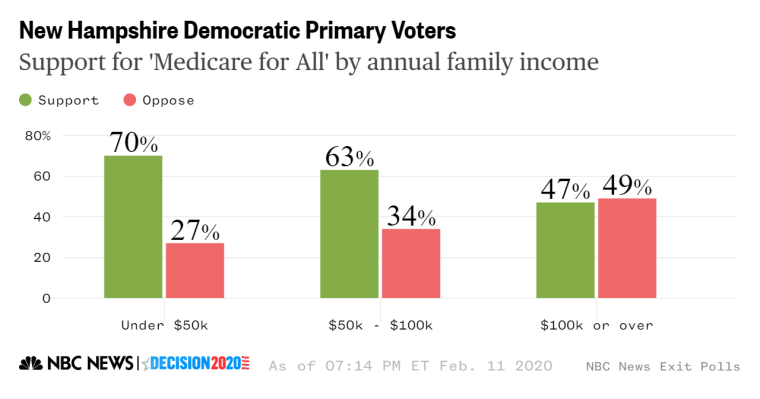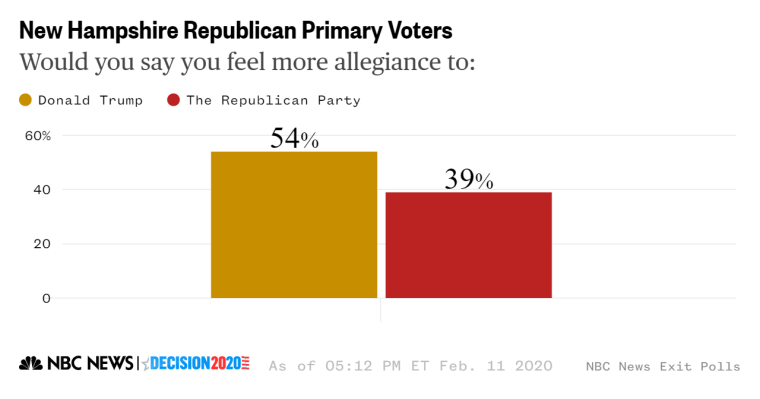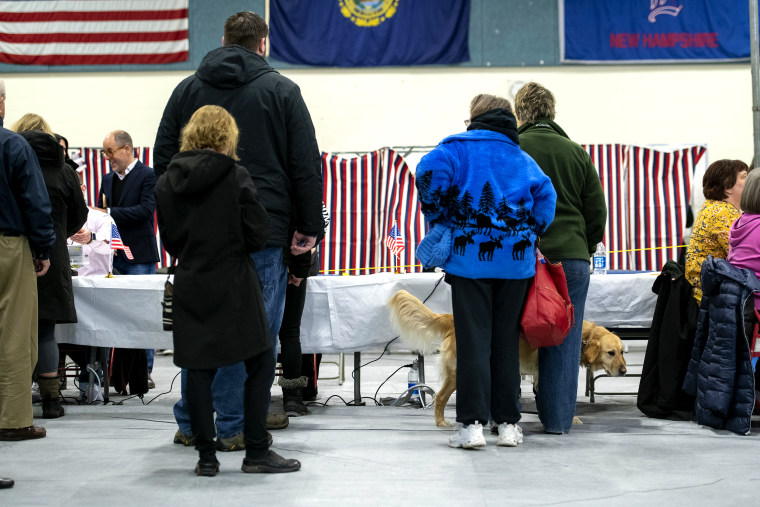Sen. Bernie Sanders, I-Vt., rode a wave of support from younger voters, liberals and long-time backers to score a narrow victory in Tuesday's New Hampshire Democratic president primary, NBC exit poll data showed.
Overall, Granite State voters who participated in the Democratic primary were divided by ideology, age and the qualities they're looking for in a nominee to challenge President Donald Trump in November, according to the data.
By a nearly 2-to-1 ratio, Democratic voters said they would rather see a nominee who can beat Trump than one who agrees with them on the issues. Sixty-three percent held that view while 34 percent said that they would prefer a nominee who agrees with them on major issues.
Among those who value issues over electability, Sanders was the clear choice at 39 percent, with former South Bend, Indiana, Mayor Pete Buttigieg following at 21 percent and Sen. Amy Klobuchar, D-Minn., at 12 percent.
But among those who said beating Trump was the top priority, their top choices were Buttigieg (28 percent), Sanders (21 percent), Klobuchar (20 percent) and former Vice President Joe Biden (10 percent).
As expected, Sanders did well with self-identified liberals, according to NBC polling data. The Vermont senator captured 33 percent of the vote from this group, followed by Buttigieg with 22 percent and Klobuchar at 15 percent.
Sen. Elizabeth Warren, D-Mass., got just 13 percent of self-described liberals, polling data showed.
Among those voters who called themselves moderate, Klobuchar and Buttigieg were virtually tied at 28 percent and 26 percent, respectively, with Sanders following at 16 percent and Biden at 12 percent.
And among Democratic voters who said they want a candidate to "unite the country," Klobuchar and Buttigieg were tied at 31 percent followed by Biden with 14 percent and Sanders with 9 percent, the data showed.
Conversely, among Democrats who said "bringing change” was a top priority, Sanders led with 35 percent, followed by Buttigieg with 23 percent, Klobuchar and Warren with 12 percent and Biden with 8 percent.
Age played a counter-intuitive role in Tuesday’s Democratic primary, with younger voters backing older candidates and older voters supporting younger ones, polling data suggested.
Voters 44 and younger in the Democratic primary made the 78-year-old Sanders their clear top choice, at 42 percent. Sanders was particularly strong among voters between 18 to 29, taking 51 percent of the vote from that group.
That contrasts to Democratic voters 45 and older who strongly backed two of the younger candidates, in 59-year-old Klobuchar (27 percent) and the 38-year-old Buttigieg (26 percent).
An unusually large number of New Hampshire primary voters say they waited until the final days of the campaign to settle on a candidate.
The data showed that 50 percent of Democratic respondents said they made up their minds in the last few days, higher that in 2016 (25 percent) and 2008 (38 percent).
And of those late-deciding voters, they most favored Buttigieg (28 percent), Klobuchar (23 percent) and Sanders (16 percent).
Klobuchar got a particularly solid bump from Friday's debate, the polling data showed. Of who said that event was an important factor in who they picked, 27 percent went for Klobuchar, followed by Buttigieg (25 percent) and Sanders (19 percent).
But among those who said they'd made up their mind last year, Sanders won 46 percent of those voters.

When asked whether having a woman as the presidential nominee would be a plus or a minus in the general election against Trump, 56 percent of Democratic primary voters said they don't believe it would matter either way.
Among the remainder, though, more say a female nominee would have a harder time, rather than an easier time, beating Trump, polling data showed.
Women (34 percent) were more likely than men (26 percent) to believe that nominating a woman would actually make it harder for a Democrat to beat Trump.
New Hampshire voters in both parties agree that Trump has emerged from impeachment largely unscathed, the early exit poll data showed.
Less than a quarter of those voting in the Democratic primary said Trump’s impeachment has hurt his re-election chances.

Fifty-nine percent of Democratic voters said impeachment made no difference to Trump’s re-election effort, early exit polls showed, while 15 percent said the proceedings even helped him.
Two-thirds of GOP voters said that impeachment has helped Trump while just 5 percent said it has hurt his chances.
Policy priorities of Democrats
Democrats were split in their vision of the party's future, with 40 percent of respondents saying they would like to see a return to policies of President Barack Obama, 38 percent demanding more liberal action and 12 percent seeking a more conservative course.
New Hampshire Democratic primary voters also said they generally like the idea of “Medicare for all,” but opinions differ sharply along the lines of income, according to early polling data.
Establishing a single, government-run health plan (like Medicare for All) was a popular proposal among those with annual family incomes of less than $50,000, as 70 percent of voters from that group favored it in the polling data.

But support slips sharply among Democrats higher up the income ladder. Among those from households making more than $100,000 per year, opinion on a plan like Medicare for All was split, with 47 percent in favor and 49 percent opposed.
And among Democratic voters who said they were falling behind financially, Sanders was the top choice of this group at 35 percent.
When asked about the most important issues, 37 percent Democratic respondents said healthcare was the top concern, 28 percent climate change, 19 percent income inequality and 11 foreign policy.
Democratic voters: More likely to be women, highly educated
New Hampshire voters in Tuesday's Democratic primary were more likely to be female and more educated than their GOP counterparts.
Of Democratic voters, 55 percent had at least a bachelor's degree while 33 percent of GOP voters had their four-year college degree, polling data showed.
Fifty-eight percent of Democratic voters were women, while just 42 percent of GOP primary voters were female.

Compared to Democrats, Republican voters were twice as likely — 22 percent to 10 percent — to be military veterans.
All of these differences mirror the demographics of Democratic and Republican supporters across the nation.
Republicans strongly back Trump
Republicans who voted in the GOP primary on Tuesday solidly backed Trump, who faced only nominal competition on the GOP side.
Nearly 9 in 10 of those GOP voters said they believe Trump has kept his campaign promises, and nearly 9 in 10 also said they were either “enthusiastic” or “satisfied” with the current administration.
About 8 in 10 said they support building a wall spanning the U.S.-Mexican border, Trump’s signature campaign issue of 2016, and 95 percent voters in the Republican primary said they feel the economy is in either “excellent” or “good" shape.
And when asked if they felt more loyalty to the president or the GOP — 54 percent of Republican primary voters said Trump while 39 percent said the party, according to the polling data.

Emotions were running high among voters in both parties, polling data showed.
Among Democrats, 81 percent said they were "angry" with the Trump administration, 14 percent "dissatisfied," 3 percent "satisfied" and 2 percent "enthusiastic." It was nearly flipped among Republican primary voters, with 61 percent saying they were "enthusiastic" about the president, 26 percent "satisfied," 6 percent "dissatisfied" and 6 percent "angry."

